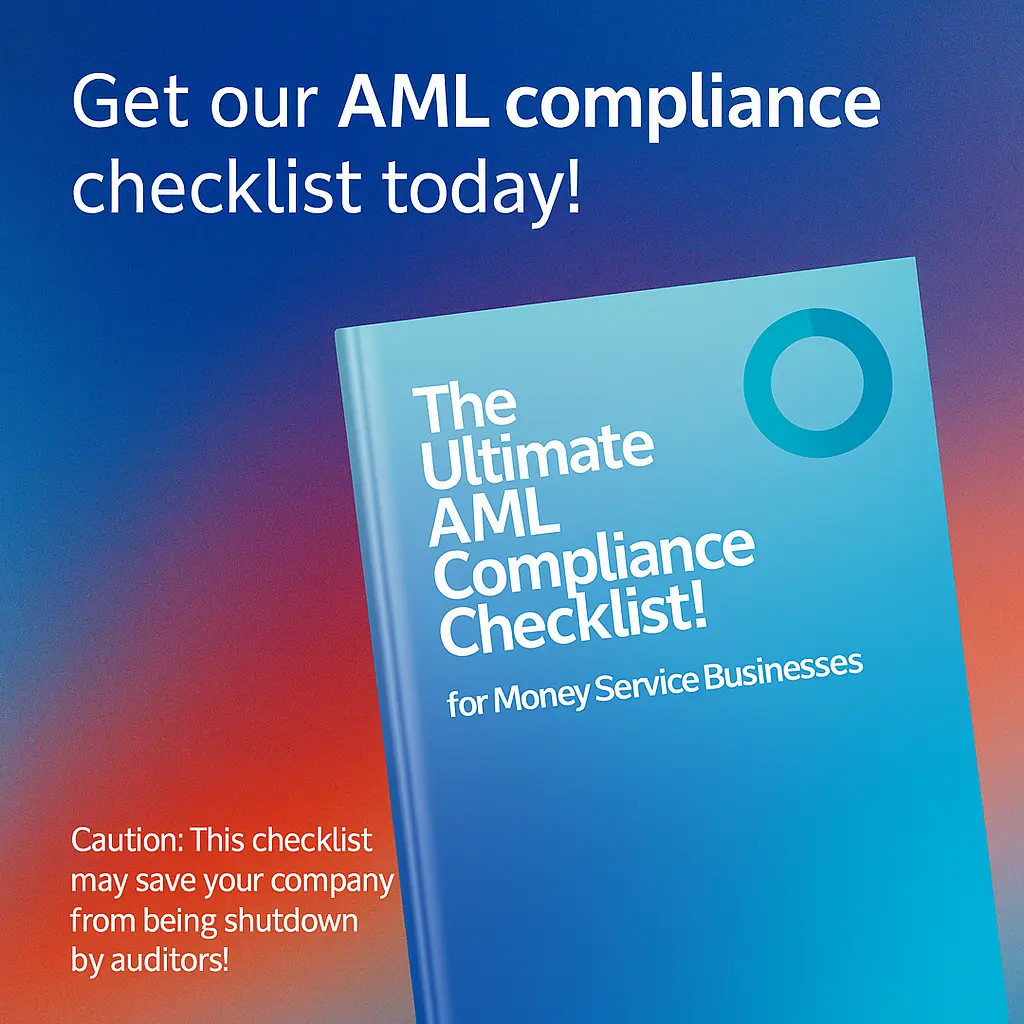What Is AML Compliance?
AML (Anti-Money Laundering) compliance is essential for money service businesses. It ensures that your operations follow international regulations to detect and prevent suspicious financial activity.
Understand Your Compliance Obligations
Understanding AML Compliance in the Money Services Industry
AML stands for Anti-Money Laundering. It refers to the laws, regulations, and procedures designed to prevent criminals from disguising illegally obtained funds as legitimate income. In the money services sector, AML compliance is not optional — it’s a legal obligation.
MSBs (Money Service Businesses) are required to identify suspicious activity, report large transactions, and verify the identity of clients through KYC (Know Your Customer) protocols. Proper AML compliance ensures financial transparency, builds trust, and protects your business from regulatory penalties.
Whether you’re exchanging currency, processing remittances, or operating in high-risk areas, AML compliance is the foundation of operational legitimacy and resilience.
Why Non-Compliance Can Be Costly
AML non-compliance can have serious consequences for money service businesses. Whether accidental or intentional, failure to meet regulatory obligations may result in devastating penalties.
Fines & Penalties
Hefty fines from financial regulators for missing reports or ignoring AML policies.
License Suspension
Regulators may suspend or revoke your business license, halting operations instantly.
Criminal Liability
Severe AML breaches can result in personal liability, including criminal prosecution.
Reputational Damage
Loss of trust from partners and customers can severely impact long-term business success.
AML Requirements for Money Service Businesses
Money service businesses are subject to strict AML regulations. Meeting these requirements is essential to protect your customers, your business, and your license.
- ✅ Collect customer identification: Verify identity using government-issued ID and store KYC data securely.
- ✅ Monitor & report suspicious transactions: Detect unusual activity and file reports accordingly.
- ✅ Maintain records: Store client & transaction data in compliance with your jurisdiction’s retention policy.
- ✅ Screen against sanction lists: Automatically check against OFAC, PEP, UN, and global watchlists.
- ✅ File reports: Submit CTRs, SARs/STRs, and other regulatory filings based on thresholds and risk models.
How CurrencyXchanger Supports AML Compliance
- Automated KYC forms: Collect, store, and manage customer identity data efficiently.
- OFAC/PEP/Sanctions screening: Instantly flag high-risk clients across global watchlists.
- Transaction thresholds: Define limits & trigger alerts based on regulatory rules.
- Audit-ready reporting: Generate exportable summaries with built-in filters.
- Secure data logging: Every action is logged with time, user, and audit trail.
Trusted by AML-Focused MSBs Worldwide
Talk to Our Compliance ExpertsTop questions answered
In this section, you can address common questions efficiently.
AML stands for
Anti-Money Laundering. It refers to a set of laws, regulations, and procedures aimed at detecting and preventing the use of financial systems to conceal illegally obtained funds.
Yes. Any business that handles currency exchange, money transfers, or financial transactions is legally required to comply with AML regulations. Failure to do so can lead to fines, license suspension, or even criminal charges.
KYC (Know Your Customer) is a component of AML compliance. While KYC focuses on verifying the identity of customers, AML encompasses a broader framework that includes monitoring transactions, reporting suspicious activity, and staying aligned with regulatory expectations.
AML compliance software automates key tasks such as KYC data collection, screening clients against global watchlists, detecting unusual activity, setting transaction thresholds, and generating audit-ready reports — significantly reducing manual effort and human error.

Request Demo


